
The state of vitality among
Gen Z adults in the U.S.
The second annual Vitality in America study, commissioned by The Cigna Group, explores the state of vitality in the United States along with health attitudes, behaviors, social determinants of health, and experiences in health care and work – as well as how people’s perceptions on these topics have changed and evolved since 2022.
As part of this year's study, we've done a deep dive into Generation Z adults (those born between 1997 and 2005), the cohort most notable for lower vitality levels in 2022. In addition to the main vitality survey fielded among a general population sample of 10,000 adults, an additional survey was fielded among 4,000 adults, one quarter of whom were members of Gen Z. We found that Gen Z’s mental health challenges play a considerable role in their lower vitality. So does their financial insecurity, as money is top of mind for Gen Z. We also found that Gen Z still struggles with loneliness. Many are underwhelmed by their experience in the workplace and feel burned out. Interestingly, Gen Z reports more negative consequences resulting from social media use than non-gen Z generations.
Let’s take a closer look at this very distinct group of U.S. adults, and how Gen Z individuals can improve their health, well-being, and vitality, as well as how employers can help them do so.
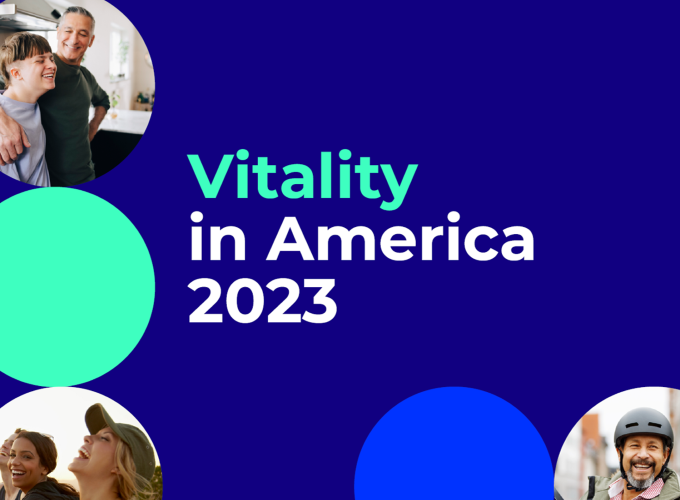
Keep scrolling for the full report, or download it as a PDF
Prefer to read this content in PDF format? We've got you covered. Click to download below, or keep scrolling to view the full findings.
Table of contents
- Digging into Gen Z’s mental health challenges
- Gen Z struggles with financial insecurity and conflicted expectations for the future
- Gen Z workplace vitality insights
- Gen Z social media utilization and impact on vitality
- Key takeaways on vitality and Gen Z
Digging into Gen Z’s mental health challenges
Even though Gen Z’s vitality is trending upwards, this cohort still has the lowest vitality across generations. In particular, Gen Z emotional well-being is a struggle, with significantly fewer of them reporting their mental health as excellent or good compared with older generations. One reason is because Gen Z adults are significantly less likely to rate their own mental health as excellent/good compared with older generations.
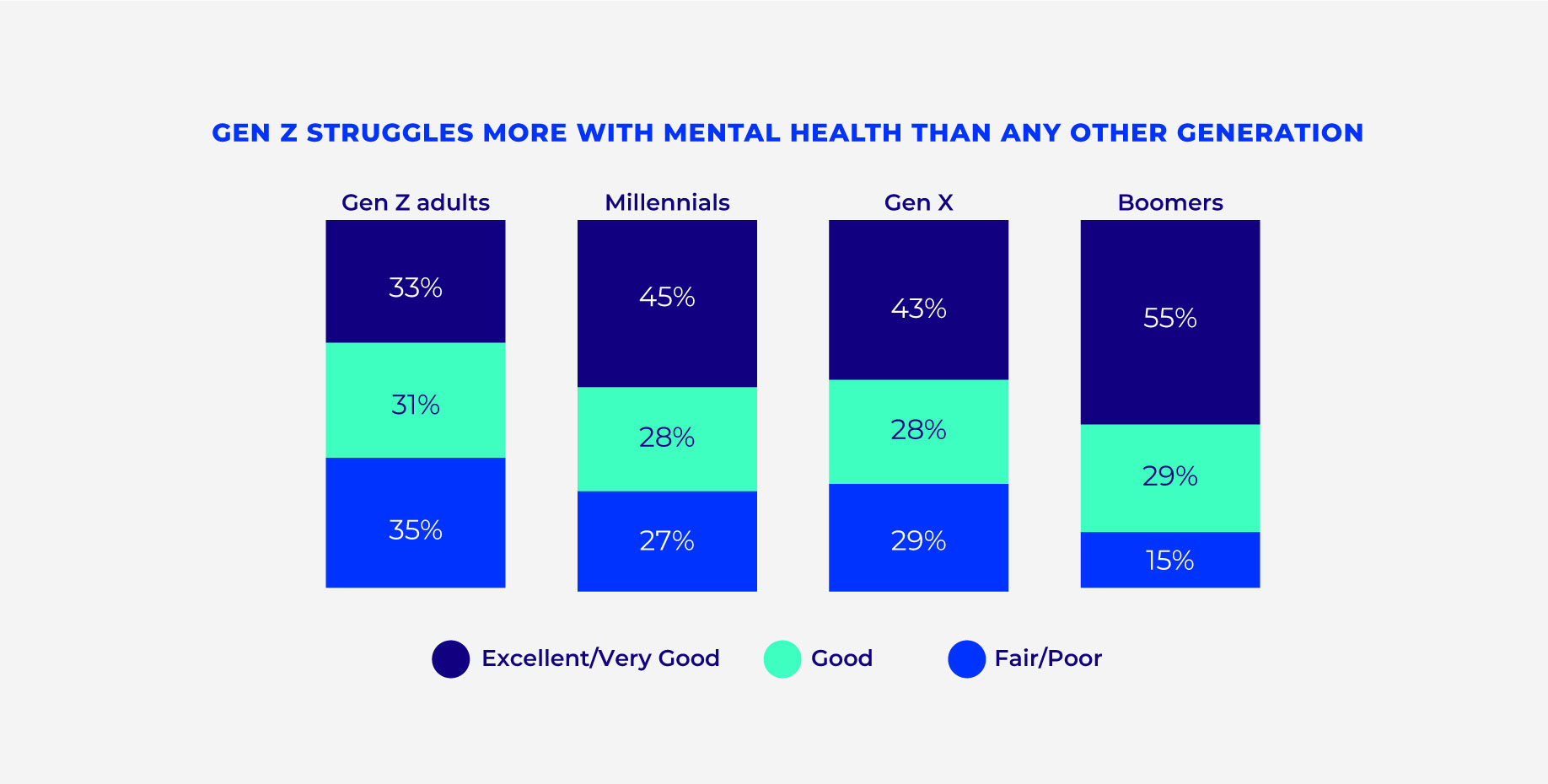
Gen Z women in particular report poor mental health, with only a quarter (26%) describing their mental health as excellent or very good, compared with 43% for Gen Z men.
This generation has significantly lower perceptions of their personal confidence and self-esteem. Again, this is especially pronounced for Gen Z women – only 27% describe their confidence and self-esteem as excellent or very good and only 29% see their body image as excellent or very good, compared with 40% and 41% of Gen Z men, respectively. White Gen Z adults were more likely than their Black counterparts to report struggling with their mental health, body image, and confidence. In fact, Black Gen Z adults have particularly strong body image – almost double that of white Gen Z adults.
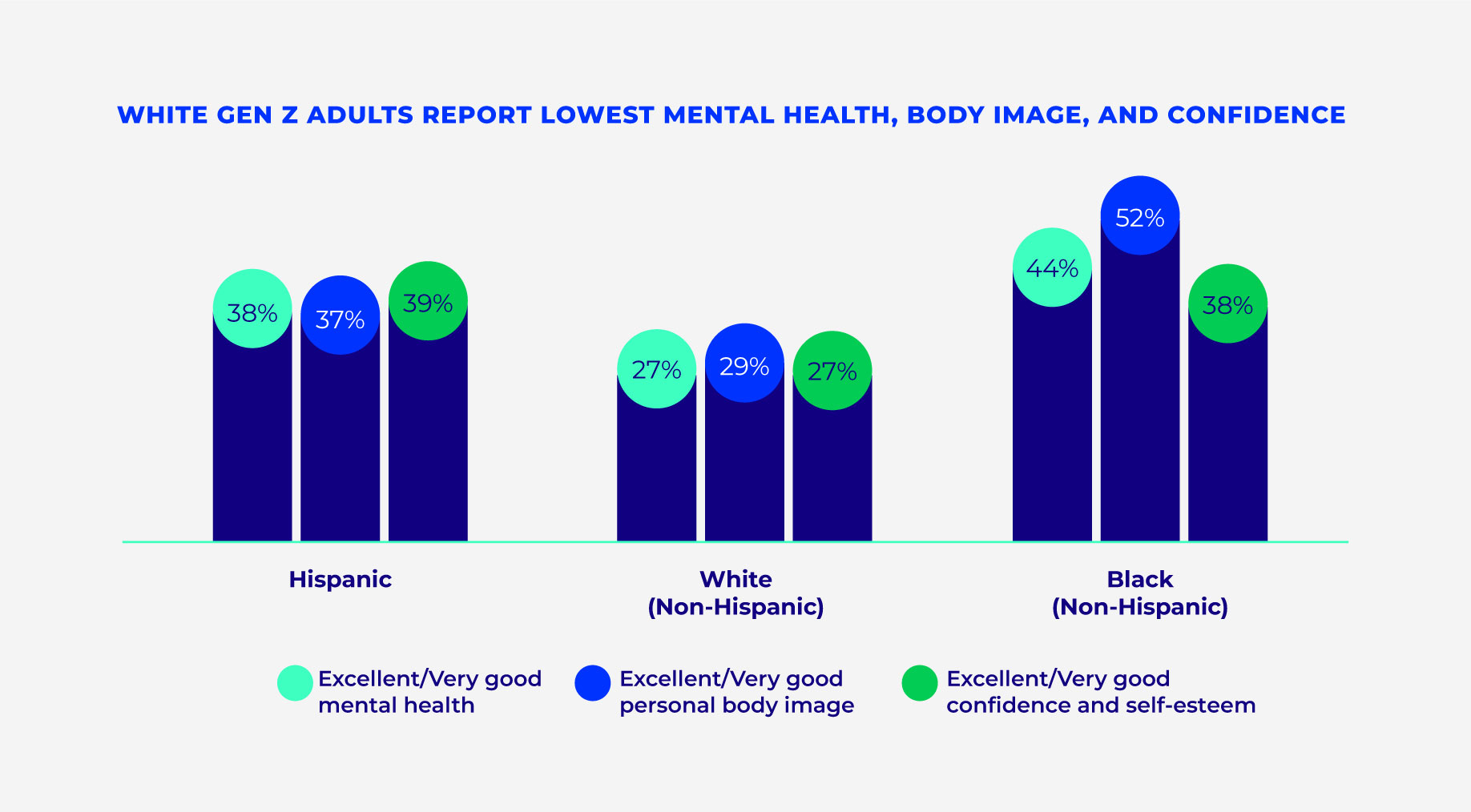
Gen Z adults feel relatively dissatisfied with their life compared with older adults, with only a third feeling positive about their quality of life or that the things they do in their life are worthwhile, which is significantly lower than older generations.
Based on the data from our main vitality survey, we see that 27% of Gen Z adults have been diagnosed with clinical depression/anxiety, similar to Millennials (30%) and Gen X (30%). About one-third of Gen Z adults report seeking care from a mental health professional (30%). Our research shows this cohort appears to be struggling more with mental health challenges than older generations. In fact, 42% of Gen Z adults believe health issues are a major problem facing their generation, with 53% citing mental health as the most important health problem. Among low vitality Gen Z adults, this number jumps to 65%. Poor mental health significantly impacts the daily life of Gen Z. Roughly half report their poor mental health keeps them from taking care of responsibilities and from concentrating on doing important tasks. More than 4 in 10 also report poor mental health keeps them from going out of the house, getting around on their own, or participating in social activities.
One of the reasons Gen Z struggles most with mental health is that they lack the resilience older generations have had time to develop, and they are far lonelier. This cohort also struggles to feel like they belong and that they have people in their life they connect with and are supported by.
Many Gen Z adults report a gap between the social and community connections they want and what they have been able to achieve. Three quarters of Gen Z adults say having deep and loving relationships is a very or somewhat important goal in their life, but 57% say they lack companionship. Less than half (38%) feel confident in their ability to make friends and establish connections (37%). More than half (56%) of Gen Z adults want to contribute to their community, but only 36% feel they currently belong in their community.
We believe helping Gen Z find ways to meaningfully contribute to their communities could improve their mental health, vitality, and sense of belonging and help them to forge social connections. Those with higher vitality are significantly more likely to volunteer, say they have a sense of purpose, and connect strongly with their community.
Gen Z wants to develop stronger social connections and family bonds but struggles with doing so. They view their family structure less solidly than older generations and seem to miss out on many of the benefits provided by a strong family bond. Older generations are more likely to think of their family as the immediate group of people they live with (spouse, children, etc.), while Gen Z tends to have a looser definition that includes any relative.
The majority of Gen Z agree their family cares for one another, has fun together, and supports each other, but at much lower levels than older adults. Because of these weaker bonds, Gen Z adults are not realizing the same health benefits as older adults: Gen Z has less family support in making healthy changes, avoiding unhealthy habits, and encouraging physical activity. Gen Z adults with high vitality are significantly more likely to indicate their family is caring, supportive, and fun than Gen Z adults with low vitality. Additionally, nearly half (44%) of Gen Z adults felt stressed all the time or often about their family or social relationships, significantly more than Gen X and Boomers. High vitality Gen Z adults are significantly more likely to have stronger family connections than their low vitality counterparts.
Gen Z struggles with financial insecurity and conflicted expectations for the future
Gen Z adults are experiencing financial struggles that contribute to their lower vitality. More than half (55%) experienced stress about their finances, a higher percentage than older generations (42%). Most Gen Z adults – and older generations – agree that financial and/or economic concerns are the most important problem facing their generations right now, citing the high overall cost of living (35%) and inflation (25%) as the biggest financial problems.
Fifty-eight percent of Gen Z report an income of less than $50K a year. For low vitality Gen Z, this number is even higher: A whopping 70% of low vitality Gen Z adults earn less than $50K per year, and 39% make under $25K. The majority (57%) of Gen Z with low vitality have found their income was too low to cover their living expenses over the past year.
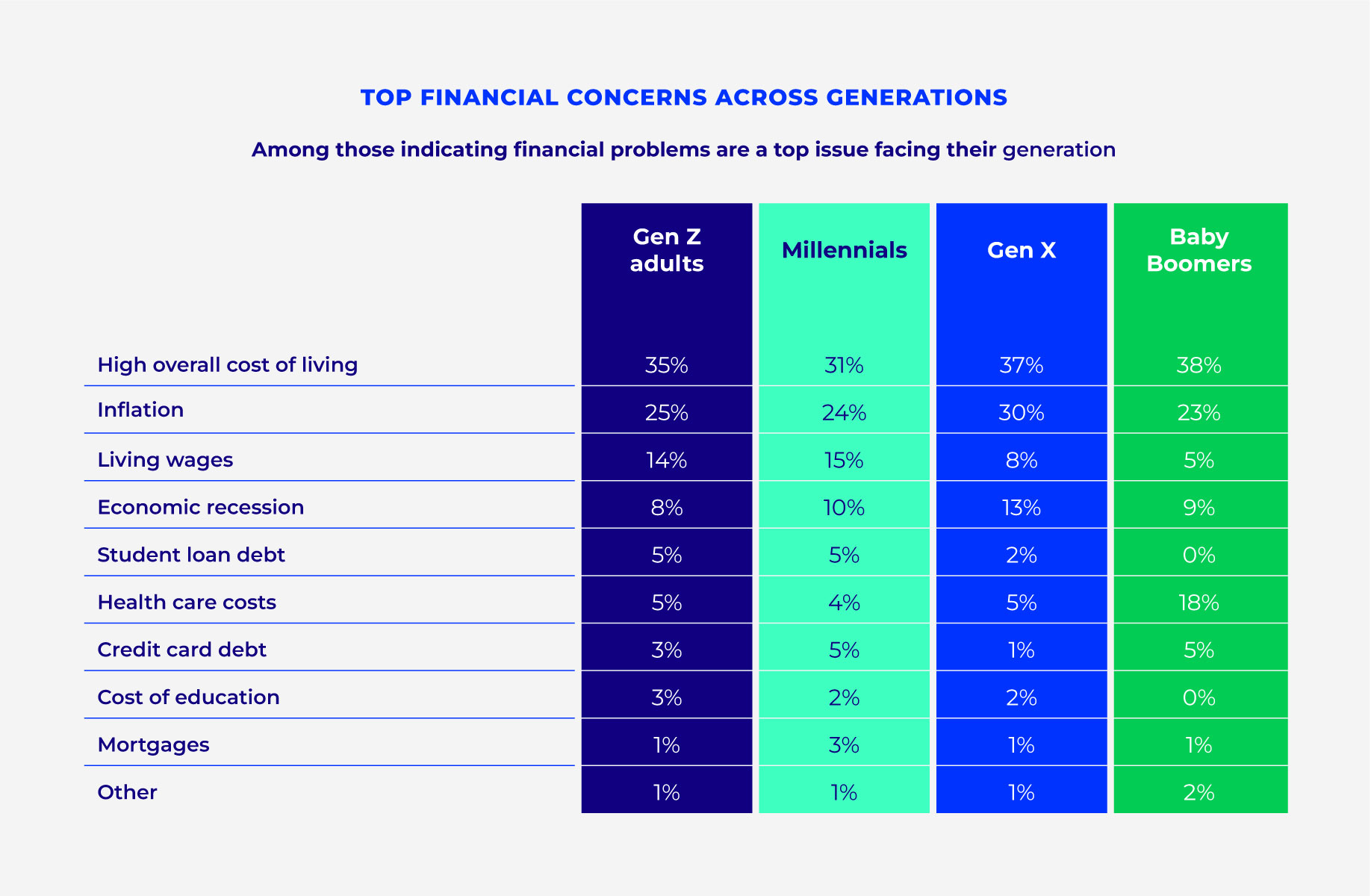
The research shows that Gen Z has tempered optimism for their personal direction and greater pessimism for the direction of society at large. Those reporting high vitality report more optimism about the future, suggesting a strong connection between vitality and future outlook.
Vitality plays a big role in their outlook on the future. Many (44%) feel the life opportunities available to them personally are extremely or very promising. Slightly fewer (40%) feel they have control over their future. However, only 26% of Gen Z adults feel optimistic about the direction of society in general. Male Gen Z adults are more likely to feel optimistic about the direction of society compared with females (33% males vs. 20% females).
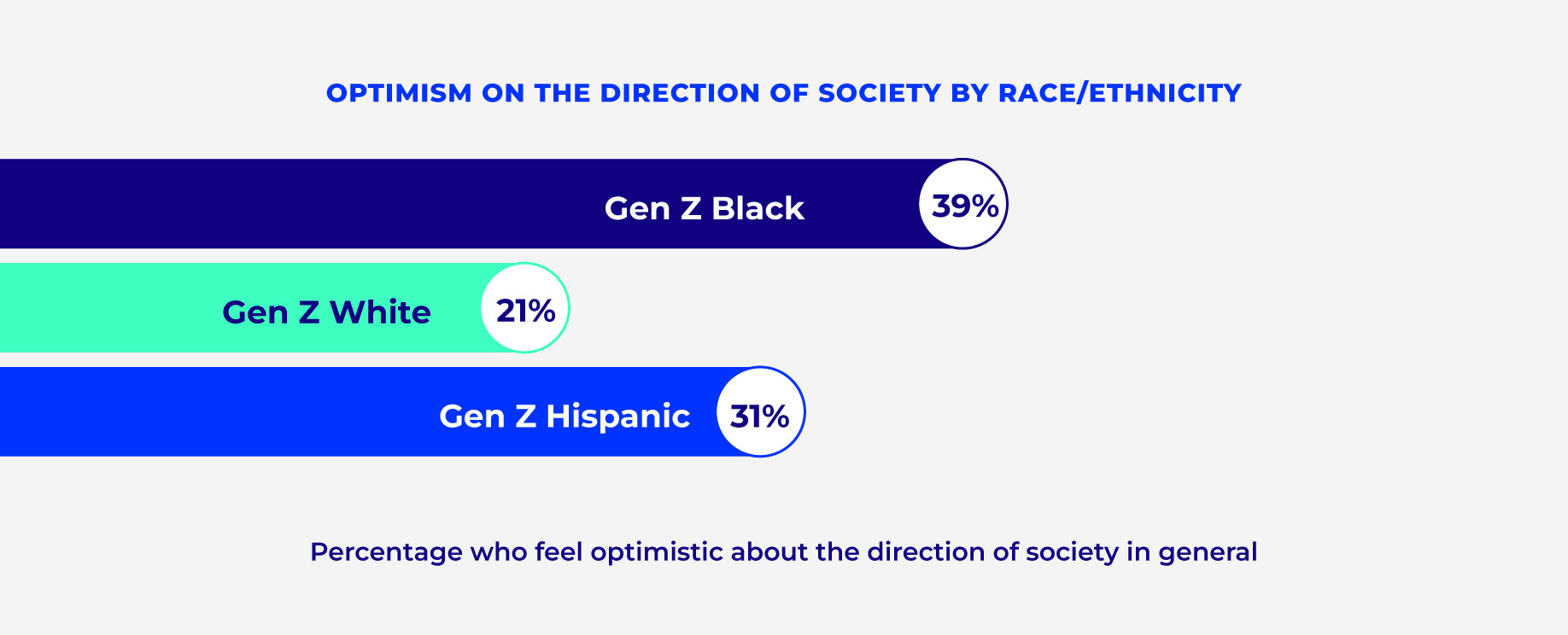
While all generations agree that financial/economic problems are the most important challenges our society faces, Gen Z places higher emphasis on societal issues (driven by human rights problems and racism) than older generations.
Given their younger age, many of the top personal goals Gen Z adults have for the next five years are geared toward settling into their life: saving money, advancing in their career, and buying a home. Other top priorities include spending more time with family and friends and on personal hobbies and interests.
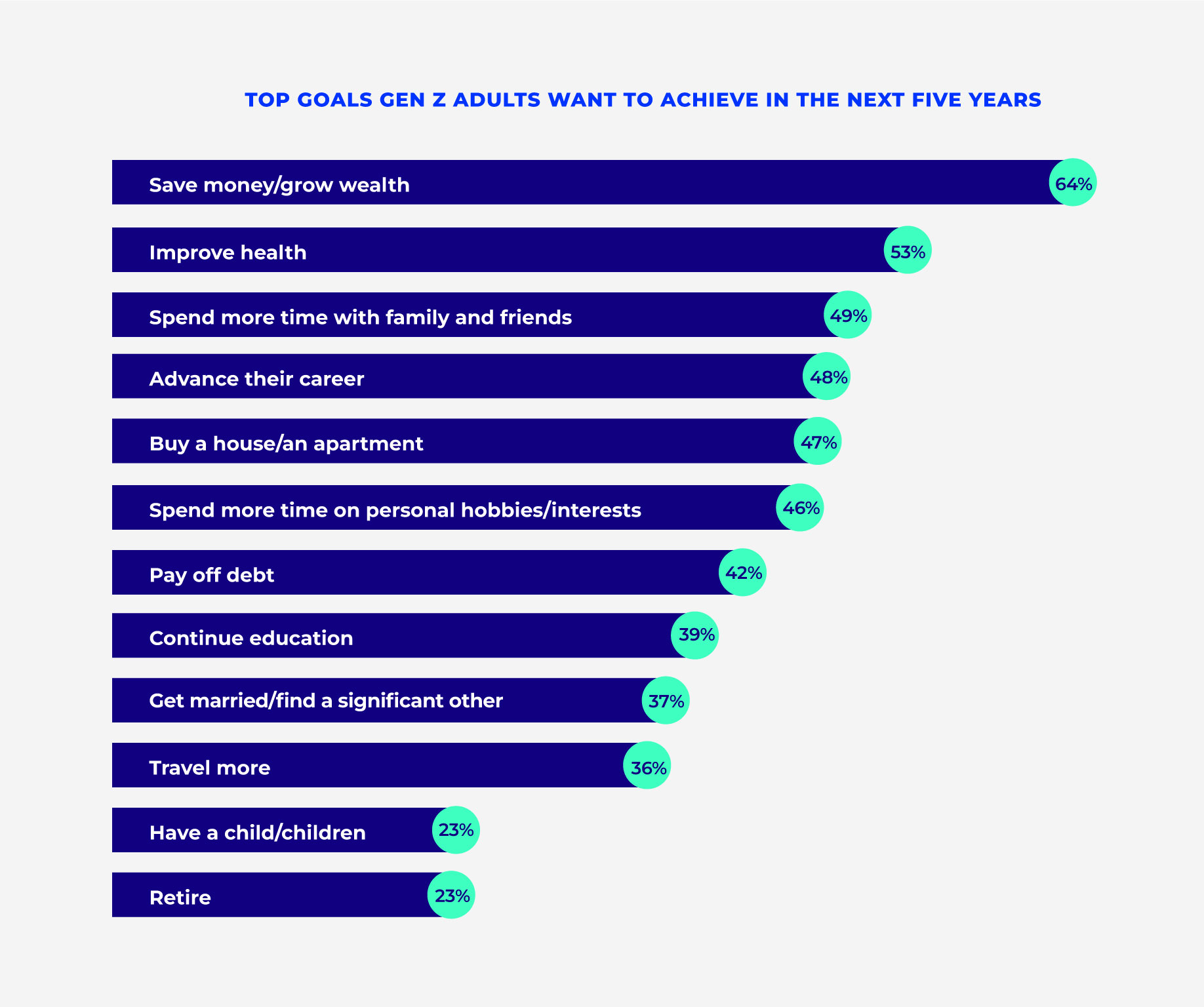
Gen Z workplace vitality insights
Just starting out in their profession, Gen Z is underenthused by their work. The cohort is most commonly working in retail (13%), health care (11%), and hospitality (11%), industries that tend to require in-person work. These newer workers experience a disconnect between their expectations for their career and the reality of their current job.
While most employed Gen Z adults say they are satisfied with their job, they still lag older generations (66% very or somewhat satisfied with job vs. 78% for non–Gen Z). Gen Z is least satisfied with their salary, the benefits provided, their chances for advancement, and the sense of meaning or purpose in their job. Gen Z adults are also less likely to feel they have autonomy at work, that their work has meaning, or that their job/company is making a positive difference. Nearly half (41%) feel burned out in their job. And 59% of employed Gen Z adults have plans to look for a new job.
Given these workplace insights around Gen Z, it is unsurprising this cohort feels less capable and less confident in their ability to do their job well. But they aren’t giving up: Gen Z places a higher priority on developing their skills, gaining expertise, and earning professional certifications and degrees than Gen X and Baby Boomers.
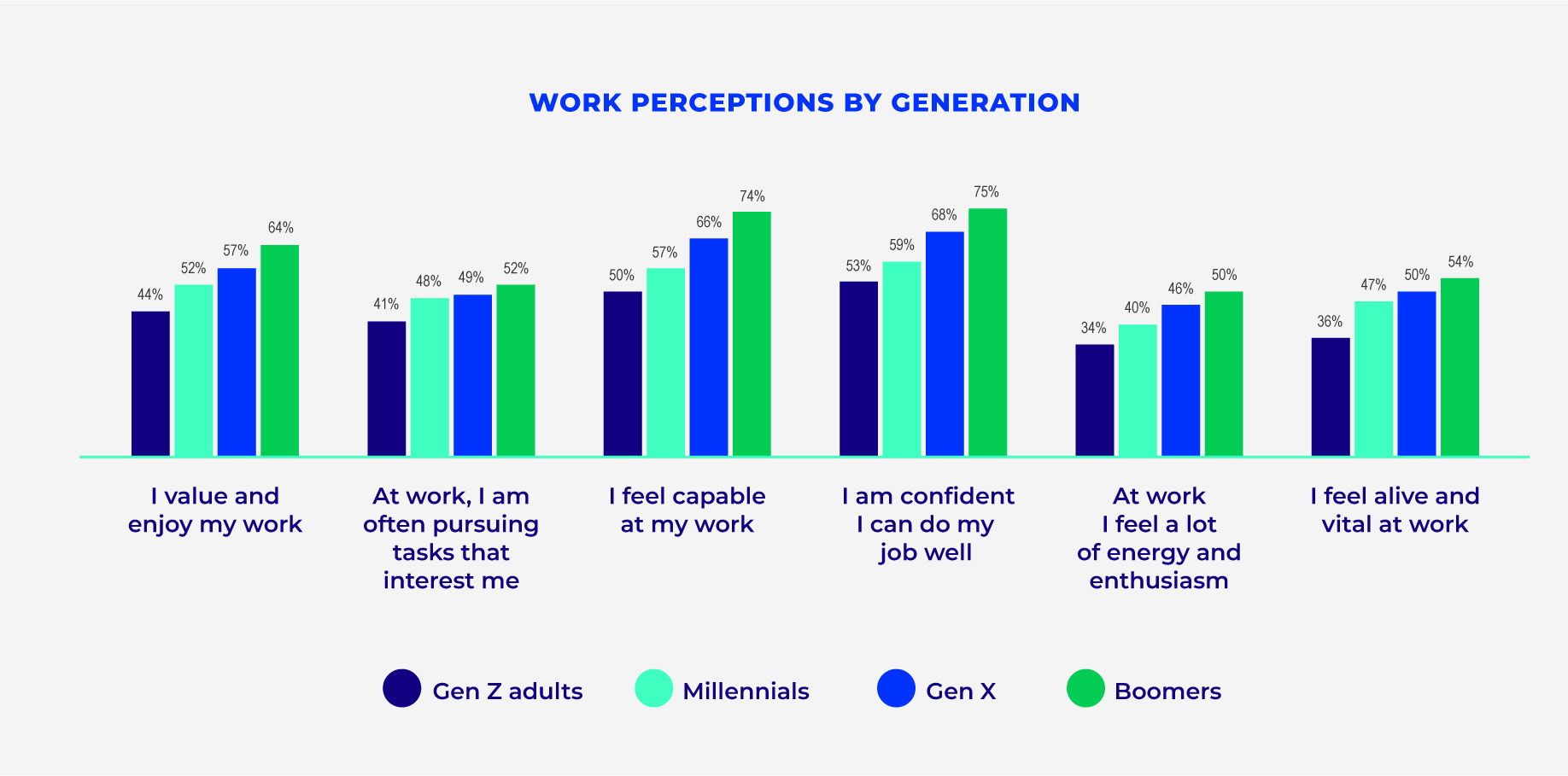
Another reason Gen Z has lower levels of vitality than their older working counterparts is that managerial and social relationships appear to be weaker for Gen Z employees. Significantly fewer Gen Z workers report feeling understood by their managers, and fewer feel their managers are as confident in their abilities as they are with workers in older generations. Compared with older workers, Gen Z employees also feel less close to people at work and are less likely to say they have a lot in common with the people around them on the job.
Our research uncovered a disconnect between how Gen Z currently works and how they would prefer to work. The majority of employed Gen Z adults work completely in person, while most would prefer to work a hybrid arrangement or remotely. Only 62% say they are satisfied with the way they work (in person/hybrid/remote).
Gen Z’s top professional goal for the next five years is to make more money, which is consistent across generations and vitality levels. Interestingly, few would look to their current employer for help in achieving their professional goals, except for earning more money. While half aspire to find a job with meaning/purpose, only 26% want their current employer to help them achieve that. Nearly half want to develop their current skills and learn new skills, but only about a third want help doing so from their current employer. This may suggest that many view their current employer as a stepping stone and not where they’ll find themselves in five years.
Given Gen Z’s financial insecurity and their stated desire to earn more money, it’s unsurprising that salary is their top consideration when looking for a new job. Flexibility of work hours, a sense of meaning/purpose, and chances for advancement are next in importance to Gen Z. They are also closely aligned with Millennials on many of the nontraditional benefits that would be important to them when considering new employment: days off after major holidays, six months maternity/parental leave, four-day workweeks, paid family and medical leave under FMLA, and onsite health care.
Only half (50%) of Gen Z employees are satisfied with the benefits provided by a employer. A third of Gen Z employees subscribe to and use their employer-sponsored health insurance. Older generations report higher utilization and higher satisfaction with their benefits.
The most utilized benefit among Gen Z is paid time off, and even that is utilized to a lesser extent than other generations. Lower subscription to employer-sponsored health insurance may be due to Gen Z’s age, as they can remain on a parent’s insurance until age 26 (33% of Gen Z has health insurance through a parent’s plan). One in five (21%) Gen Z adults who has access to an employer-sponsored retirement plan does not contribute to it. With 58% of Gen Z having a household income of less than $50K, they may not be concerned about contributing to a 401(k) plan at this time.
Gen Z social media utilization and impact on vitality
Unsurprisingly for this digital-first generation, social media use is highest among Gen Z, with nearly all Gen Z adults (96%) using some form of social media daily. Most are logging in to YouTube, Instagram, TikTok, Snapchat, or Facebook at least once a day. Their presence on newer platforms, such as Instagram, TikTok, and Snapchat, is much higher than older generations.
Gen Z adults are most likely to be logged in to social media in the afternoon, early evening, and nighttime. Weekly screen time is similar among Gen Z, Millennials, and Gen X. However, Baby Boomers log the most weekly screen time, with 50% spending five or more hours a day on a screen. This encompasses all screen time, including TV, computer, smartphone, and other devices for purposes other than work or school-related activities.
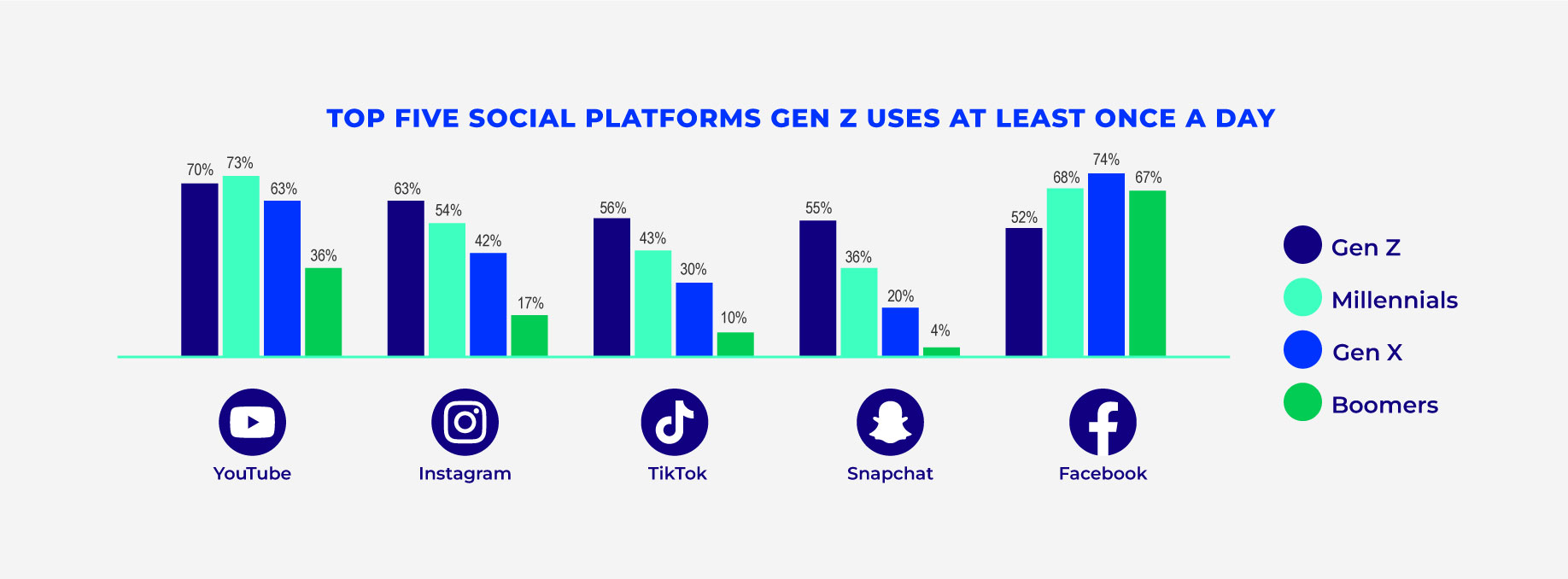
Since social media use among Gen Z adults is ubiquitous, it is unsurprising that they report experiencing more positive benefits from social media than older generations. Across generations, many adults agree that social media provides entertainment and helps them keep in touch with family and friends. In addition, Gen Z is more likely than older generations to feel social media has helped them discover new ideas, learn new skills, find new hobbies, find communities with similar interests, make money, find products that improve their life, and learn how to manage their health and well-being.
Despite these positive benefits, 83% of Gen Z adults report some form of negative consequences from social media, significantly higher than older generations. Gen Z adults are more likely to say that social media usage has resulted in struggles with self-esteem/self-image, difficulty focusing on reality, bullying, and negative comparisons to peers. More than 1 in 5 (21%) of Gen Z adults say they have lost/damaged personal relationships with friends, family, or loved ones because of social media.
Gen Z is more attached to social media than older generations, with nearly three-quarters having started using it at a young age. In fact, 73% of Gen Z adults began using social media by the time they were 15. Only 44% of Gen Z adults believe they are addicted to technology, but 67% feel most other people their age are addicted, and 40% say they’d like to spend less time on social media.
Key takeaways on vitality and Gen Z
- Gen Z continues to struggle with their mental health, with women in particular reporting poor mental health. This generation reports lower personal confidence and self-esteem, more concerns about body image, and relative dissatisfaction with their personal and professional lives.
- Gen Z adults are concerned about their financial situation, and this too contributes to their low vitality levels. Many don’t earn enough income to sustain their living expenses, and they are concerned about the high cost of living, inflation, living wages, and other expenses that contribute to their financial insecurity.
- This cohort of younger adults lacks resilience and struggles with loneliness. They feel disconnected from their families and their friends, which impacts their vitality and their mental health. They want to play a role in improving their communities, and our research suggests that helping them find ways to do meaningful work could help enhance vitality.
- Gen Z is generally underwhelmed by their workplace experience. While many are satisfied with their current job, they aren’t satisfied with their salaries, benefits, or chances for advancement. They also lack a sense of purpose in the work they do. As a result, many feel less capable and confident in their ability to get their work done.
- Gen Z’s social media utilization is higher than any other demographic’s, and while this cohort recognizes that social media has negatively impacted their self-esteem and self-image, they believe social media is helping them connect with people, entertainment, and new ideas.

Read chapter 1: Vitality in America 2023
Take a closer look at this year’s Vitality in America research, which gives insight into how individuals can improve their health, well-being, and vitality, as well as how employers can help their workforces do the same.